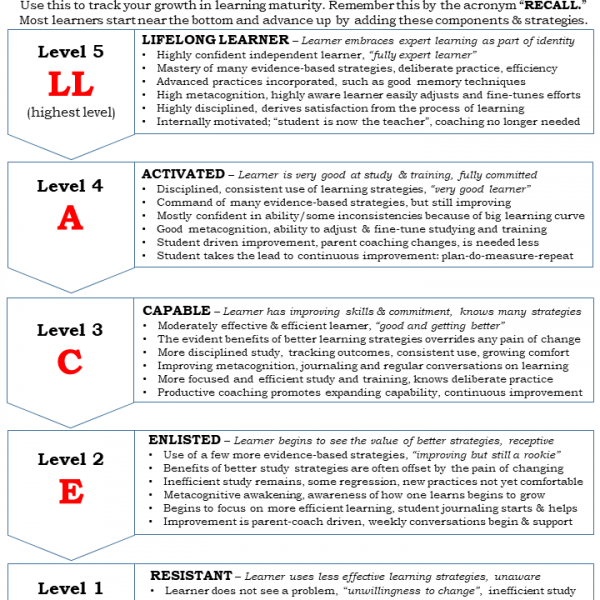
8 Terms Every Parent Coach Needs to Know

Reading time: 8 minutes
These are important things that you need to understand in order to start to become an effective coach. All are covered in greater depth in the Pa 10 and Pa 100 course.
(1) Deliberate Practice
“How expert one becomes at a skill has more to do with how one practices, than with merely performing a skill a large number of times.” In “So Good They Can’t Ignore You,” author Cal Newport states that ridiculously successful people are so successful because they’re experts at practicing — they can push themselves to the exact limit of their skillset and thus expand their abilities.
This should be the number one goal for the parent coach – to encourage a study process that is focused and highly effective in promoting learning and retention.
It is not easy at first – you will need to continually coach this until it becomes a habit — if you want your children to be ridiculously successful.
(2) Ebbinghaus Forgetting Curve
Developed by a German psychologist who pioneered the experimental study of memory in the 1870s. His studies showed, without deploying memory techniques, that after reading or being exposed to information, only about twenty percent of it will be retained 48 hours later.
This provides the fundamental reason for the need to use evidence-based learning strategies. Practically speaking, if you are reading a book and engaging in a single ineffective memory technique like highlighting passages, two days from now will have lost 80 percent of the information you just read.
(3) Imposter Syndrome
“High-achieving individuals marked by an inability to internalize their accomplishments and a persistent fear of being exposed as a ‘fraud’.” It is particularly common among high achievers. This is not a mental disorder that requires treatment, it is considered a reaction to certain situations.
Psychological research conducted in the 1980s estimated that two out of five successful people may consider themselves frauds. Parents need to be alert to the possibility that their children may suffer from this, particularly if they are high achievement students. Provide lots of positive feedback and success stories can be helpful.
(4) The Illusion of Learning
The false belief that learning is occurring when it is not.
This illusion can be overcome by frequent self-testing.
Often confused with success during repetitive practice when that success comes from the predictability of the routine instead of deeper understanding or knowledge. The illusion can also occur when new information is stored in short term memory and therefore be accessed, but has not yet been transferred to long term memory.
One major cause is the natural tendency to make learning “comfortable,” which often results in prematurely dismissing your productive training regimens because they initially seem too “hard.” The most effective learning occurs when the brain is pushed slightly outside its comfort zone, and kept there for acceptably short periods of time.
The fundamental problem is that harder, but more productive exercises have lower initial success rates, which is often confused for less learning.
(5) The Pomodoro Technique
The description for the optimal learning time unit before taking a break. In general, shorter study units which are more deep and intense, are superior to longer units. This is true for several reasons, including brain fatigue, and the benefit of allowing for diffuse thinking to follow.
For most students, 25 minutes is an ideal interval before taking a short break. The brain is an “energy hog” and needs frequent rest. See deliberate practice above. A handy timer is an essential enabling tool to this, as a person in deep or deliberate practice often becomes unaware of time.
(6) Dunning-Kruger Effect
“Relatively unskilled persons suffer illusory superiority, mistakenly assessing their ability to be much higher than it really is…[and] highly skilled individuals may underestimate their relative competence and may erroneously assume that tasks which are easy for them are also easy for others.” (related: overconfidence effect)
The first effect explains why 98 percent of golfers rate their skills at the 50th percentile or above. It is also why students may resist or dismiss needed study technique improvement. This has potential problems for parent coaches, as this it can lead to faulty assessment of the difficulty of learning a task, thus inadequate student coaching.
(7) Spacing Effect
“The phenomenon whereby learning is greater when studying is spread out over time, as opposed to studying the same amount of time in a single session.” Spaced presentation is superior to massed practice, the trying to power through a subject in a single sitting.
Practically, this effect suggests that if it takes 3 hours to learn something, it is best broken into, for example, three one-hour intervals over a single three hour session. It also suggests that “cramming” the night before an exam is not likely to be as effective as studying at intervals in a longer time frame. “Cramming” certainly results in reduced and poor recall.
(8) Fundamental Attribution Error
When we are trying to understand and explain what happens in social settings, we tend to view behavior as a particularly significant factor. We then tend to explain behavior in terms of internal disposition, such as personality traits, abilities, motives, etc. as opposed to external situational factors. This can result in blaming people for things outside their control.
A good example of this is the dysfunctional view of “procrastination” – seeing it as a character defect, instead of a naturally occurring attribute of the brain triggered by external stimulation.
Instead, this should be seen as an accepted naturally occurring phenomenon which should be managed by tactics and habits.
Parent Coaching Suggestions
Familiarize yourself with these concepts, they should be integrated into your coaching conversations. Clearly explain each of these to your child so that you develop a common understanding of these concepts. Incorporate these into the language that you and your child use to talk about studying and learning. Actively use these terms in your study planning and review meetings to describe what you are doing.






